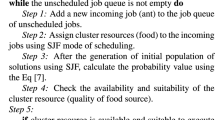Abstract
Grid computing has been evolved as a high performance computing to fulfill the demand of computational resources among the geographically dispersed virtual organizations. Grid is used to provide solutions to the complex computational intensive problems. Scheduling of user applications on the distributed resources is an indispensable issue in Grid environment. In this paper, a speed-constrained multi-objective particle swarm optimization (SMPSO) technique-based scheduler is proposed to find efficient schedules that minimizes makespan, flowtime, resource usage cost and maximizes resource utilization in Grid environment. The work is integrated in ALEA 3.0 Grid Scheduling simulator. The results of the proposed approach have been contrasted with Grid’s conventional scheduling algorithms like FCFS, EDF, MinMin, and other multi-objective algorithms like NSGA-II and SPEA2. The results discussed in the paper shows that SMPSO outperforms over other scheduling techniques.
Access this chapter
Tax calculation will be finalised at checkout
Purchases are for personal use only
Similar content being viewed by others
References
Mandeep Kaur (Computer Science Dept University of Pune), “Semantic Resource Discovery with Resource Usage Policies in Grid Environment,” International Journal of. Compuer Science Issues, vol. 9, no. 5, pp. 301–307, 2012.
R. Buyya and S. Venugopal, “A Gentle Introduction to Grid Computing and Technologies,” Computer Society of India, no. July, pp. 9–19, 2005.
K. Krauter, R. Buyya, and M. Maheswaran, “A taxonomy and survey of grid resource management systems for distributed computing,” Software - Practice and Experience, vol. 32, no. September 2001, pp. 135–164, 2002.
J. M. Schopf, “Ten actions when Grid scheduling: The User as a Grid Scheduler,” Grid Resource Management: state of the art and Future trends, pp. 15–23, 2004.
A. Pugliese, D. Talia, and R. Yahyapour, “Modeling and Supporting Grid Scheduling,” Journal of Grid Computing, vol. 6, no. May 2007, pp. 195–213, 2008.
P. Varma, U. Grover, and S. Chaudhary, “QoS-Aware Resource Discovery in Grids,” 15th International Conference on Advanced Computing and Communications (ADCOM 2007), pp. 681–687, 2007.
J. Carretero and F. Xhafa, “OPMENT OF ECONOMY TECHNOLOGICAL USE OF GENETIC ALGORITHMS FOR SCHEDULING JOBS IN LARGE SCALE GRID APPLICATIONS,” pp. 11–17, 2006.
F. Xhafa, J. Carretero, B. Dorronsoro, and E. Alba, “a Tabu Search Algorithm for Scheduling Independent Jobs in Computational Grids,” Computing and Informatics, vol. 28, pp. 1001–1014, 2009.
H. Izakian, B. T. Ladani, K. Zamanifar, and A. Abraham, “A Novel Particle Swarm Optimization Approach for Grid Job Scheduling.”
H. B. Grosan C, Abraham A, “Multiobjective evolutionary algorithms for scheduling jobs on computational grids.,” International conference on applied, computing, pp. 459–463, 2007.
Q. U. Of, E. Ware, and C. Delimitrou, “Scheduling in Heterogeneous Datacenters With P aragon,” vol. 2, no. 5, pp. 17–30, 2014.
C. A. C. Coello, F. Luna, and E. Alba, “SMPSO: A New PSO Metaheuristic for Multi-objective Optimization,” no. 2.
D. Klusacek, L. Matyska, and H. Rudova, “Grid Scheduling Simulation Environment,” Parallel Processing and Applied Mathematics, vol. 4967, pp. 1029–1038, 2008.
C. a. Coello Coello and M. Reyes-Sierra, “Multi-Objective Particle Swarm Optimizers: A Survey of the State-of-the-Art,” International Journal of Computational Intelligence Research, vol. 2, no. 3, pp. 287–308, 2006.
Q. Bai, “Analysis of Particle Swarm Optimization mAlgorithm,”Computer and Information Science, vol. 3, no. 1, pp. 180–184, 2010.
D. Klusáček and H. Rudová, “Alea 2: job scheduling simulator,” International ICST Conference on Simulation, pp. 61:1–61:10, 2010.
R. Buyya and M. Murshed, “GridSim: a toolkit for the modeling and simulation of distributed resource management and scheduling for Grid computing,” Concurrency and Computation: Practice and Experience, vol. 14, no. February, pp. 1175–1220, 2002.
E. Zitzler, M. Laumanns, and L. Thiele, “SPEA2: Improving the Strength Pareto Evolutionary Algorithm,” pp. 1–21, 2001.
K. Deb, A. Pratap, S. Agarwal, and T. Meyarivan, “A fast and elitist multiobjective genetic algorithm: NSGA-II,” IEEE Transactions and Evoutionary Computation., vol. 6, no. 2, pp. 182–197, 2002.
Author information
Authors and Affiliations
Corresponding author
Editor information
Editors and Affiliations
Rights and permissions
Copyright information
© 2017 Springer Science+Business Media Singapore
About this paper
Cite this paper
Mandeep Kaur (2017). Multi-objective Evolution-Based Scheduling of Computational Intensive Applications in Grid Environment. In: Satapathy, S., Bhateja, V., Joshi, A. (eds) Proceedings of the International Conference on Data Engineering and Communication Technology. Advances in Intelligent Systems and Computing, vol 469. Springer, Singapore. https://doi.org/10.1007/978-981-10-1678-3_44
Download citation
DOI: https://doi.org/10.1007/978-981-10-1678-3_44
Published:
Publisher Name: Springer, Singapore
Print ISBN: 978-981-10-1677-6
Online ISBN: 978-981-10-1678-3
eBook Packages: EngineeringEngineering (R0)




